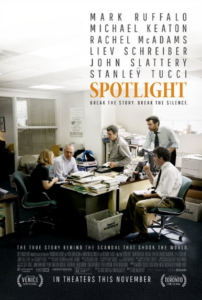
 “Spotlight” centers on a small team of investigative journalists with the Boston Globe. The film is based on true life events. The Globe Spotlight Team shared a 2003 Pulitzer Prize for exposing the coverup by leaders in the Catholic Church of a massive molestation crisis.
“Spotlight” centers on a small team of investigative journalists with the Boston Globe. The film is based on true life events. The Globe Spotlight Team shared a 2003 Pulitzer Prize for exposing the coverup by leaders in the Catholic Church of a massive molestation crisis.
Starting in the months prior to terrorist attacks of September 11, 2001, the Boston Globe took a risk and began to seriously look into suspicious events within the local Catholic Archdiocese. In one scene, a psychologist who studied instances of molestation among Catholic clergy for many years describes the problem as a full blown psychiatric condition, a systematic phenomenon. To their horror, Spotlight reporters discover that this alleged condition is widespread and pervasive.
“Spotlight” is an ensemble film, no one performance dominates any other. The cast is deep with Michael Keaton, Mark Ruffalo, Rachel McAdams, Brian d’Arcy James, John Slattery, Stanley Tucci and Liev Schreiber. All are worthy of awards consideration. This is due in large part to the super-focused script, co-written by Josh Singer and director Tom McCarthy. Every actor is given something significant to do – the fascinating investigation unfolds over years right before our eyes.
The journalistic process has never seemed more interesting nor more important. Like “All the President’s Men,” “Spotlight” is about finding the story, but also making sure that it is one that can be confirmed. There are ethics involved.
Putting the pieces together, the Spotlight team does the leg-work. The investigation is methodical and never forced.
One dynamic that plays out extremely well is the presence of a new head editor named Marty Baron (Liev Schreiber). As we know now, newspapers were changed forever by the influences of Wall Street and the Internet.
That transformation was already well under way in 2011. Marty, who’s been at other big papers, finds himself in charge of the Boston Globe, much to the chagrin of the existing staff. But everyone is determined to be a professional. And after the first meeting with Marty, whose restrained, respectful manner has a calming influence, the paper seems to get a shot in the arm.
His new perspective comes not only from his experience at other publications, but, perhaps, as the film subtly suggests, because he’s not a Catholic – Marty is Jewish.
When the film opens, the church’s influence over all levels of business and government seems unshakable. Much of the Globe readers and its staff are Catholic. And while the paper had run stories about priests accused of wrong-doing in the past, never had there been a serious investigation into the systematic and clandestine processes concerning the alleged molestation problem. “Spotlight” makes objectively clear that the push to get the story is not Marty’s agenda, rather, an outgrowth of an outsider’s fresh view – Marty has a nose for news.
But one man alone is not enough, the passionate Spotlight team works tirelessly to gather up the various pieces, bit-by-bit. We learn that mere allegations alone are not enough, but evidence must be found that corroborates the story. We see how the sausage is made as journalism is performed and exercised. And the individual tales are heart-breaking.
“Spotlight” is a film that will make parents hug their children even more tightly.
Director Tom McCarthy is perfect for this material. His prior films, including “The Station Agent” and “The Visitor,” showed his patience with narrative – he lets the story evolve organically.
“Spotlight” is arguably his best film yet, and should cement him as one of the best directors working today.
The power of the pen cannot be ignored. But only when it is permitted to flourish in a free society can the written word effect change.
This is why I write.
